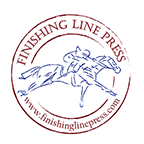In 1998, the same year Finishing Line Press (finishinglinepress.com) was founded in Cincinnati by C. J. Morrison, Leah Huete de Maines’s poetry manuscript launched the press’s New Women’s Voices Series. Four years later, Maines acquired the independent publishing house with the goal of continuing—and expanding—its mission to diversify publishing. She relocated Finishing Line Press (FLP) to Georgetown, Kentucky, and began to scale the press’s operations.
“We went from publishing just three titles a year to approximately thirty,” she says. “Today FLP proudly publishes around three hundred titles annually.” Recent titles include Michele Evans’s debut poetry collection, purl (2025), which repurposes Greek mythology “into a vessel to deftly capture the rage, the love, and the memory of generations of Black American women longing to be heard,” as Brooke C. Obie writes; and Lydia T. Liu’s debut chapbook, The problem of deer (2025), a lyric exploration of the ephemeral landscapes that shape diasporic experience.
FLP publishes poetry, fiction, graphic novels, and memoirs and accepts submissions year-round, charging a $3 submission fee for poetry manuscripts and graphic novels and a $10 submission fee for fiction and nonfiction manuscripts. During the month of November, however, the press accepts submissions with no fee. Additionally FLP hosts several annual contests, including the New Women’s Voices Chapbook Competition, which is open to writers who identify as women and who have not yet published a full-length collection. This year’s winner will be selected by Deirdre Fagan and receive publication, a royalty contract, and a cash prize of $1,500. Ten finalists will also be included in the chapbook series. Submissions are open until October 15. Maines notes that when she took over the press in 2002, the publishing landscape outside of FLP was “heavily dominated” by older white male voices. “By highlighting women and other marginalized voices—writers from diverse cultural backgrounds and orientations,” she says, “I wanted to change that narrative.”









